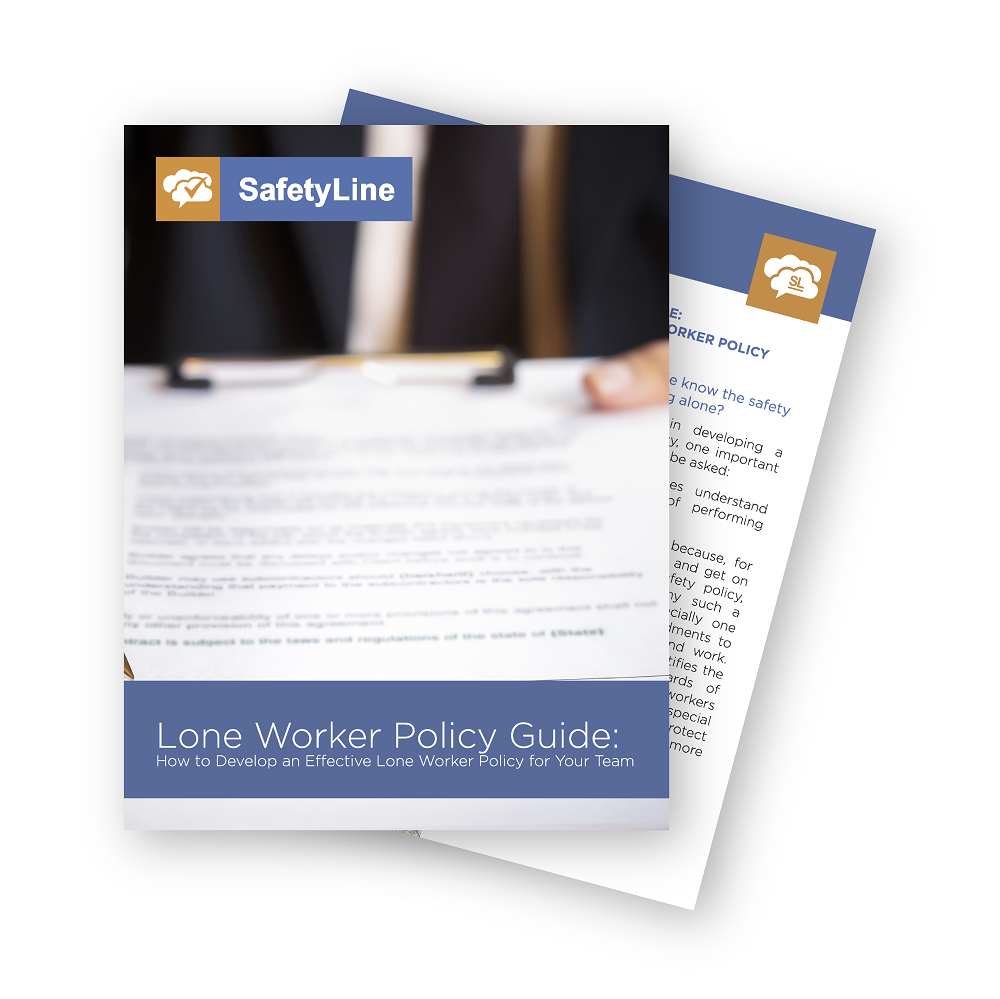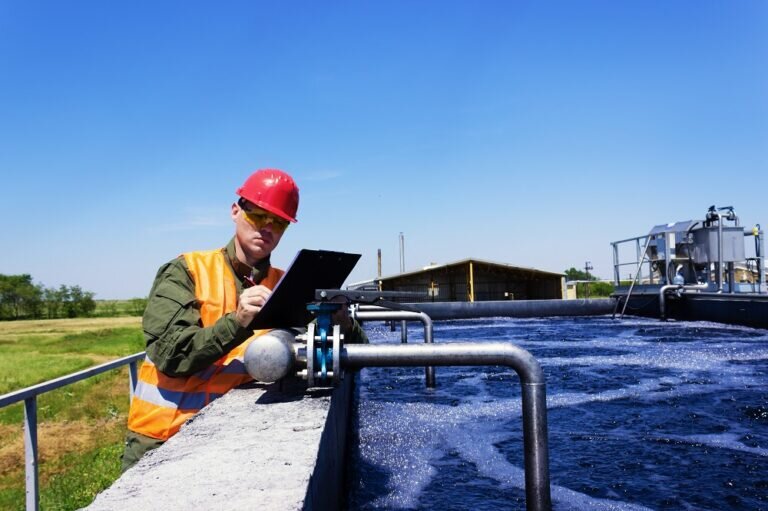Featured Resources
Lone Worker Policy Guide and Template
A lone worker policy is an effective way to ensure that your lone workers are well-educated on your company’s work-alone rules and have extensive knowledge of all workplace hazards that could be encountered on the job.
Hazard Assessment Guide
In the process of doing a hazard assessment for your workplace, it is almost a certainty you’ll learn information about the operational aspects of your organization you were unaware of before the assessment.
View eBook
Develop a Free Lone Worker Program for Small Teams
Developing a free lone worker check-in system is a simple process for small teams that any organization can implement.
View eBook
SafetyLine Blog Categories
General Safety | Lone Worker Safety | SafetyLine News and Updates | SafetyLine Product Updates | Compliance, Policy, and Regulations | Downloadable Resources |
What Does a Lone Worker Look Like?
In the picture above, can you spot out the lone worker? No? That’s because the lone worker comes from every background and demographic, looking like you and I. This is the first article of a three-part series: Setting Up a Lone Worker Safety Program. The profile of a lone worker has…
Speaking Up to Your Team About Safety Culture
There is a threat existing in many workplaces around the world that most people do not know about. This hazard cannot be mitigated by safety harnesses or helmets, nor can it be prevented through diligent hand washing and face masks. This danger that pervades workplace safety in all industries and in all countries is silence. One of the biggest threats to your company’s well being is having a safety culture where your workers do not feel like they can speak up at work when it comes to their safety. These people understand your company’s safety issues better than anyone and it is in everybody’s best interests that they have a loud voice in this area.
Safety and Key Elements to Successful Working Relationships with Remote Teams
Managing an entirely remote workforce is a phenomenon that many Canadian businesses would have never imagined being tasked with. However, the past few months have forced companies across Canada to adjust to new work-from-home environments. One of the most important drivers of workplace productivity is the network of working relationships within an organization. This article will breakdown the key components of fostering successful relationships with remote working teams.
Should you leave your remote workers alone?
With all of the things going on in the world right now, the safety of workers, remote workers, in particular, is a big concern. For any employer, it is a big job to keep their remote team safe and productive during these unique times, on top of the challenges of maintaining productivity operations. When it comes to remote workers, managers can spend a lot of time making sure these staff members are safe and are getting their work done. The good news is that…
Biological Hazards in the Home for Work From Home Employees
As Canadians continue to spend increased amounts of time at home in light of COVID-19, keeping a clean and safe at-home work environment is more important than ever. Keep in mind that some of the most dangerous hazards are not obvious and may be difficult to see. This article will identify the biological hazards that could be present in your home. It will also suggest techniques to eliminate these risks and preserve your safety while working from home.
Developing a Free Lone Worker Program
If an emergency occurs, lone workers rarely have the resources or back-up necessary to safely deal with the situation alone. Situations that involve confrontation, personal injury, or violence, can quickly become serious if immediate help is not available. Many organizations employ staff who are considered to be lone workers. Any adverse situation can become life-threatening if not immediately detected and resolved. This is why every organization should have a check-in system in place to ensure the safety of their people throughout the day, regardless of their location or activity.
SafetyLine’s Business Intelligence Feature with Contact Tracing to Help Combat COVID-19 Spread
With masses of people emerging from quarantine into public places, wary health officials are keeping a close eye on if or how the virus will be transmitted during this extraordinary scenario. Over the past several months, governments and health authorities have encouraged and enforced social distancing from others to stop of the spread of COVID-19. But now that we are slowing the spread through new social practices such as:
Workplace Hazards Series: COVID-19
As governments ease months-long restrictions allowing employees to return to their offices, the new reality is that these places won’t be the same as we left them. The new normal will entail increasingly structured workplaces that are more mindful of potential physical contamination. For the foreseeable future, there will be new routines and procedures that we will need to enforce and become accustomed to, seemingly normal ways of doing things that need to be shifted in order to protect team members from potential infection of the notorious virus.
So how do you address these new workplace hazards and different working environments for your team members?
SafetyLine Lone Worker Return-to-work Plan: COVID-19
Recently, the BC government released its Restart Plan that lists the steps we can take together as we start to return to the “new normal” from the COVID-19 response. In this plan, we are reminded that it has been our commitment to Work From Home and the following recommendations from authorities that have allowed us to slow the growth of this pandemic. While we should congratulate ourselves on our success thus far in flattening the curve in Brtish Columbia, however, we also need to remember that we’re not out of the weeds yet.
Regular Check-ins and Location Tracking During COVID-19: Are Your Workers Safe Right Now?
The COVID-19 virus has impacted millions of lives around world, changing how we shop, affecting how we socialize and perhaps most significantly, transforming how we work. Because of the pandemic, most of us are now working from home and in other remote offices, trying our best to adapt to this very different world…
COVID 19: Working from Home Tips From Staff At SafetyLine Lone Worker, Part 3
In continuation of Part 1 and Part 2: Working from Home Tips from Staff at Safetyline Lone Worker, we understand the challenges of working remotely. But since the public quarantine because of COVID-19, all of us truly understand what it’s like to be working at home and sometimes alone.
So we asked our team at SafetyLine ,“What is one tip that you would give someone who is working from home?”
Remote and Lone Worker Safety During the “New Normal” (COVID-19)
The spread of COVID-19 has forced most Canadian businesses to implement mandatory work-from-home policies. As much of Canada’s workforce navigates the transition of working in an office to working from home, the ability to work remotely is more important more than ever. For many industry sectors, the phenomenon of employees working from home is a novel, and possibly intimidating reality. However, this new reality is here to stay for the foreseeable future. Thus, remote workers and lone workers' safety are more important than ever right now.
COVID 19: Working from Home Tips From Staff At SafetyLine Lone Worker, Part 2
In continuation of Part 1, here at Safetyline Lone Worker, we understand the challenges of working remotely. But since the public quarantine because of COVID-19, all of us truly understand what it’s like to be working at home and sometimes alone. So we asked our team at SafetyLine ,“What is one tip that you would give someone who is working from home?”
COVID-19: Working from Home Tips From Staff At SafetyLine Lone Worker, Part 1
Here at Safetyline Lone Worker, we understand the challenges of working remotely. But since the public quarantine because of COVID-19, all of us truly understand what it’s like to be working at home and sometimes alone. #WFH
So we asked our team at SafetyLine, “What is one tip that you would give someone who is working from home?” And over the next couple of weeks, we will be posting what our team members said.
The Importance of Safety Check-ins for Water Utility Companies
What could have prevented these accidents? What could have the workers’ managers done beforehand to possibly prevent these horrible events from happening? While different safety steps could have been taken for each situation, an automated check-in system with fall detection for all of the workers mentioned may have saved their lives or at least lessened the severity of their injuries.
Is Your Workforce Feeling Stressed Working From Home? Here’s How You Can Mitigate Stress as an Employer
What is stress?
Stress can most simply be defined as our body’s reaction to any environmental change. These reactions can be physical, emotional, or mental. When we think of stress itself, we often think of it as a harmful component of our lives. However, stress can be positive as well, and it’s a normal part of everyone’s life. Positive stress can initiate motivation, desire, and alertness.
Supporting Our Community: How We’re Working for You During COVID-19
As you well know, the COVID-19 pandemic has escalated. Firstly, our thoughts go out to everyone already impacted by the disease. We appreciate all citizens’ and organizations’ efforts to self-isolate and “flatten the curve.” We also want to especially thank the healthcare workers and essential services workers on the front lines making a difference. As a result of your inspiring effort, we are now offering our SafetyLine Lone Worker monitoring service, for the next 3 months to new subscribers:
Are Work From Home Jobs Considered Lone Workers?
To slow the spread of COVID-19, restaurants, bars, and public spaces have closed throughout Canada. Following suit, offices have also shut their doors and implemented mandatory work-from-home policies to support self-isolation and social distancing mandates. For many employers and employees, this is a novel concept that requires significant adjustment. Although the transition for some industries may be seamless, other organizations will face significant challenges along the way. As Canada’s workforce shifts from office to working from home, all companies are faced with a new challenge –how to protect their staff who may now be working remotely or alone.
How To Protect Your Employees Working From Home Alone During The Coronavirus Pandemic
With the COVID-19 virus spreading across the entire globe, more of your team members are going to have to work at home and in many cases, alone. But because you’re not sharing an office with these workers, it doesn’t mean that you can’t protect your team. Here are 5 tips…
The Importance of Self-Care When Social Distancing and Working From Home
When working from home, the line between your personal and professional life can become increasingly blurred, which can make it difficult to “turn off” and relax. To maintain your emotional and physical well-being while practicing social distancing, here are some tips to keep your two worlds balanced while working from home.






















